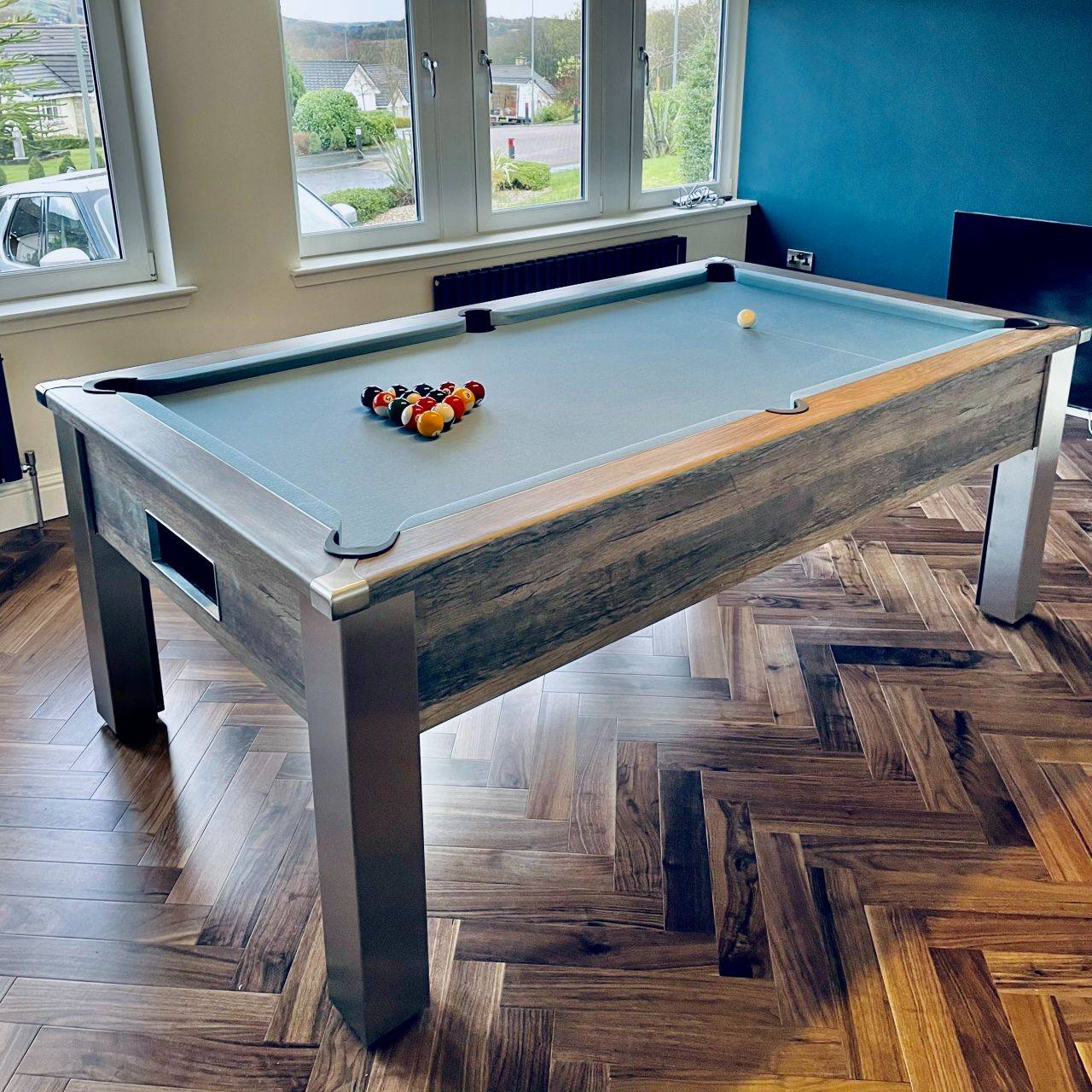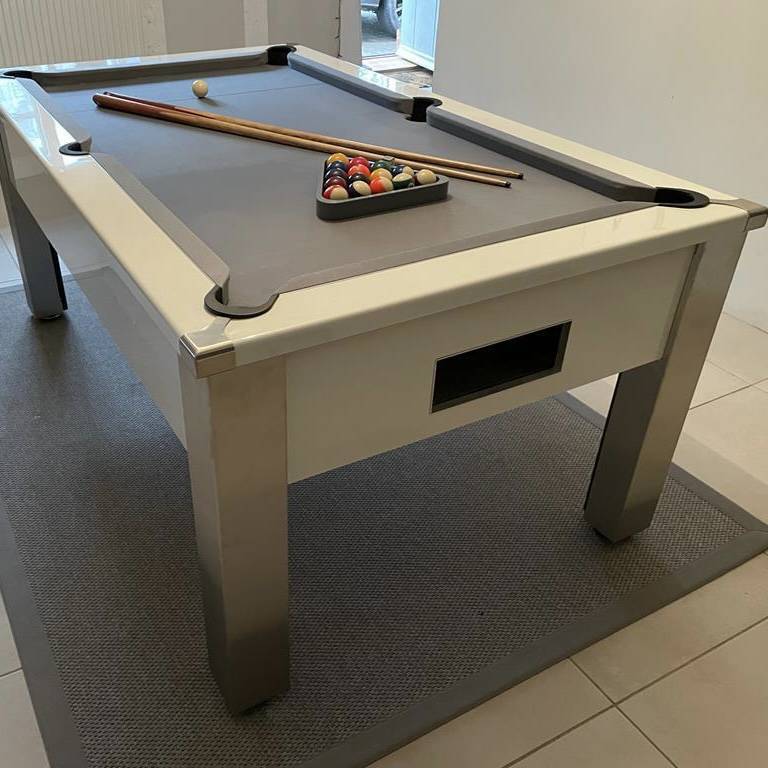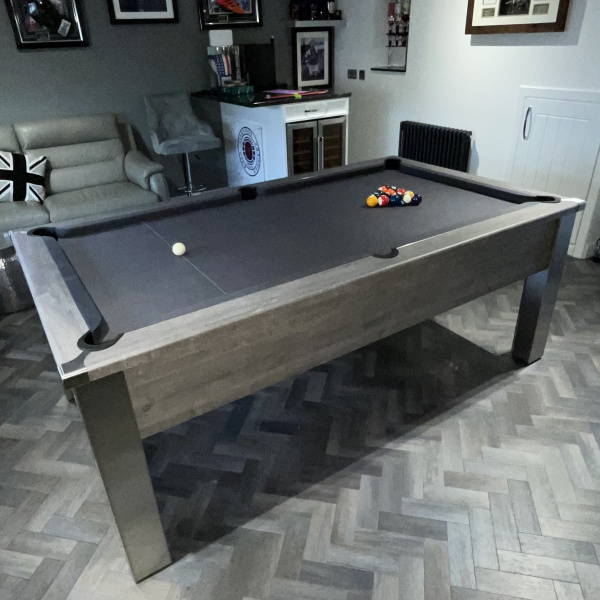Best Wood for Pool Tables: An Exploration into Craftsmanship and Quality
Pool tables, often considered the centrepiece of any game room, combine elegance, functionality, and timeless design. One of the most significant elements that influence a pool table's performance, longevity, and aesthetic appeal is the type of wood used in its construction. This article aims to explore the best woods for crafting superior pool tables, offering insights into the unique characteristics and benefits of each type.

1. Oak
Traditionally favoured for its durability and strength, oak has been a popular choice for pool tables for centuries.
- Strength: Oak's tight grain structure ensures longevity, meaning tables crafted from oak are likely to last generations.
- Aesthetic Appeal: Ranging from pale gold to deep brown, oak lends itself to various finishes, allowing for both classic and contemporary designs.
2. Mahogany
Rich, dark, and undeniably elegant, mahogany is often associated with luxury pool tables.
- Stability: Mahogany resists wood movements like warping or twisting, ensuring a lasting even surface.
- Deep Hues: Its reddish-brown tones deepen over time, making mahogany tables age beautifully.
3. Maple
Maple’s delicate grain patterns and creamy colouration make it a favourite for those seeking a more modern aesthetic.
- Durability: Hard maple varieties are incredibly resilient, resisting dings and scratches.
- Versatility: Maple’s light hue makes it perfect for various stains, from deep chestnuts to more contemporary greys or whites.
4. Cherry
Cherry wood stands out for its vibrant red undertones and smooth grain.
- Aesthetic Evolution: Cherry wood darkens gracefully over time, turning from a reddish-pink to a rich, deep red.
- Workability: It's relatively easy to shape and carve, making it ideal for tables with ornate designs or intricate leg work.
5. Teak
Teak, while less traditional, offers a unique blend of beauty and resilience.
- Weather Resistance: Traditionally used in outdoor furniture, teak has natural oils that protect against moisture, making it great for humid climates.
- Unique Patterns: Teak boasts straight grain patterns with an attractive golden-brown shade.
6. Walnut
Walnut, with its striking dark tones, brings sophistication to any gaming room.
- Strength and Stability: Walnut offers a good balance between strength and weight, ensuring durability without being overly cumbersome.
- Elegant Hues: Its rich, dark tones exude luxury, often requiring just a simple finish to showcase its beauty.
7. Pine
While softer than other woods on this list, pine offers a rustic appeal that’s hard to resist.
- Affordability: Pine is typically more affordable, making it an attractive option for those on a tighter budget.
- Characteristic Knots: These provide a distinct rustic charm, ideal for tables designed with a farmhouse or vintage aesthetic.

8. Rosewood
This exotic wood, with its dark streaks and rich colours, offers a unique aesthetic for high-end pool tables.
- Density: Rosewood is dense, ensuring a solid and durable table structure.
- Unique Grain Patterns: Its grain patterns are intricate and diverse, making each table distinct.
9. Craftsmanship and Joinery
While the type of wood is crucial, the craftsmanship and joinery methods also play a pivotal role. Dovetail joints, mortise and tenon, and reinforced corners all contribute to a table’s durability. It’s essential to ensure that the chosen wood is complemented by top-tier craftsmanship.
10. Environmental Considerations
With the increasing emphasis on sustainability, considering the environmental impact of wood sourcing is vital.
- Sustainable Sourcing: Woods like oak, pine, and maple are often sourced sustainably, ensuring minimal environmental impact.
- Reclaimed Wood: Some modern tables are crafted from reclaimed wood, offering a blend of eco-friendliness and rustic charm.
11. Combinations and Blends
Often, manufacturers employ a mix of woods to optimize both the performance and cost of a pool table.
- Layering: The primary structure may use a sturdy, durable wood like oak, while decorative elements might feature more luxurious woods like cherry or walnut.
- Veneers: High-quality veneers can reproduce the look of more expensive woods without significantly driving up the cost. They provide an aesthetic layer over a more affordable, yet durable, wood base.
12. Wood Finish and Maintenance
The choice of finish can enhance the natural beauty of the wood and prolong the table's lifespan.
- Lacquer and Polyurethane: These finishes offer a glossy look and provide excellent protection against spills and minor abrasions.
- Oil Finish: This brings out the natural beauty of woods like teak and mahogany, enhancing their rich hues while offering protection.
Regular maintenance, such as dusting and periodic polishing, ensures that the wood retains its lustre and remains resistant to moisture and external damage.
13. Wood's Influence on Sound
It might surprise some, but the wood type can influence the sound produced when the cue ball is struck or when balls collide.
- Dense Woods: Hardwoods like maple or oak can produce a sharper, clearer sound, adding to the atmosphere of the game.
- Softer Woods: Woods like pine might result in a more muted sound, which can be preferable for some settings.
14. Customization and Personalization
The choice of wood often determines the degree of customization possible.
- Carving and Inlay: Softer woods can be more easily carved, allowing for more intricate designs, while hardwoods might be more suited to inlays or veneer work.
- Staining: Lighter woods like maple are particularly versatile in accepting a wide range of stains, allowing for greater personalization in hue.
15. Cost Implications
The choice of wood is a significant factor in the overall cost of a pool table.
- Rare Woods: Exotic woods, or those that are harder to source, like rosewood, can significantly increase the price.
- Labour and Craftsmanship: Harder woods might require more effort in terms of craftsmanship, which could also influence the table's final cost.
16. Regional Variations
Where the wood is sourced from can affect its characteristics, and by extension, its suitability for pool tables.
- Climate Influence: Woods from humid regions might have different densities and moisture resistance compared to those from dryer climates.
- Local Specialties: Some regions might specialize in specific woods or crafting techniques that can influence the pool table's design and performance.

Conclusion
Choosing the right wood for a pool table is a blend of understanding aesthetic preferences, functional requirements, and budget constraints. Each type of wood, from the rich, deep tones of mahogany to the light, versatile shades of maple, brings its unique character to the table (quite literally!).
When investing pounds into a pool table, it's not just about the immediate gameplay experience. It’s about investing in a piece of art, a future heirloom, and countless memories. The type of wood, enriched by craftsmanship and design, forms the very soul of the table, ensuring that every game played is set upon a foundation of quality, elegance, and timeless beauty.
Are you looking for a Pool Table? check out our pool tables range Pool Tables





